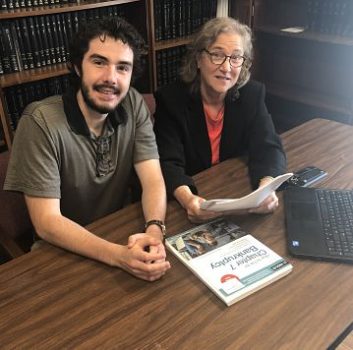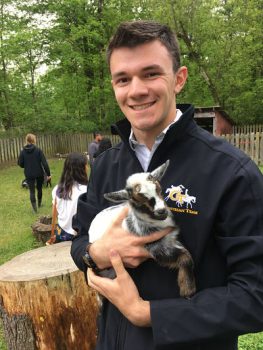Submitted by Peter Bulan ’21, one of 30 students doing community-based research this summer as a Fellow in the Upstate Institute Summer Field School

This summer I have worked as a community partner at the Legal Aid Society of Mid-New York (LASMNY) with attorney Susan Conn, who graduated from Colgate in ‘79. LASMNY is a non-profit law office based in Utica that provides free expansive legal services to low income clients in the surrounding area. The advice that LASMNY offers, which is civil in nature, ranges from divorce and domestic violence cases to social security to tenant law. Working at the Legal Aid Society has presented me with the opportunity to understand the prevailing economic issues of the Upstate New York region especially in and around Utica. Perhaps more importantly, this has granted me the chance to see the face of poverty. Having now seen the ways that poverty affects the daily lives of many has instilled in me an awareness of the dire situation that is poverty and why LASMNY is so critical. The legal system can be cold, harsh, and convoluted, and so LASMNY is an important resource that help clients navigate this system, with the hopes that they can come out unscathed. Many of those overwhelmed by the system simply submit without giving a fight and end up accumulating debt and fees. LASMNY is the solution for many who have nowhere else to turn.
The idea that one is deserving of legal representation, a right afforded to all citizens, is a key principle upon which the United States of America was founded. Two-hundred forty-three years later, the phrase “liberty and justice for all” may not ring true. Justice has not in fact been available to all. According to a report by the Legal Services Corporation, “86% of the civil legal problems reported by low-income Americans in the past year received inadequate or no legal help” (LSC). The legal needs of the low-income population and the resources that are available to them reveal a profound inequality, a ‘justice gap’ that LASMNY serves to address. The Legal Aid Society is a bastion of hope for the downtrodden, and serves thirteen counties in the central New York area.
While at Legal Aid, my primary responsibility has been working on the Consumer Bankruptcy Law Project in a student paralegal capacity. This project, which also exists as a volunteer project offered at Colgate, aims to guide a client through the entire process of filing for bankruptcy at no cost to them. I am tasked with parsing through a number of legal and financial documents including credit reports and tax forms, among others, in order to complete several of the forms, called schedules, required for one to file for bankruptcy. Completing schedules requires a significant amount of time and detail in order to ensure accuracy; this is important to note because once completed and verified for accuracy, we refer the case to a pro bono attorney in the area who will then be saved a number of hours of work. The process is therefore easier for all parties involved. A significant amount of my time has been spent working on improvements to Susan’s course. These include write ups in order to facilitate learning as well as the development of a hypothetical bankruptcy case from which students can learn. Besides working as a paralegal for the bankruptcy project, I have done ministerial work around the office.
My time as a Field School Fellow has been momentous for me. I feel much more passionate about issues affecting the Upstate New York area and feel much more confident in wanting to attend law school. It has been a great opportunity to apply some of my linguistic and analytical skills derived from my English and Spanish studies at Colgate to a very grounded situation. Being a Field School Fellow has left me feeling hopeful about my future employability and ability to positively affect my community as a Colgate student.
Source for data: https://www.lsc.gov/sites/default/files/images/TheJusticeGap-FullReport.pdf









